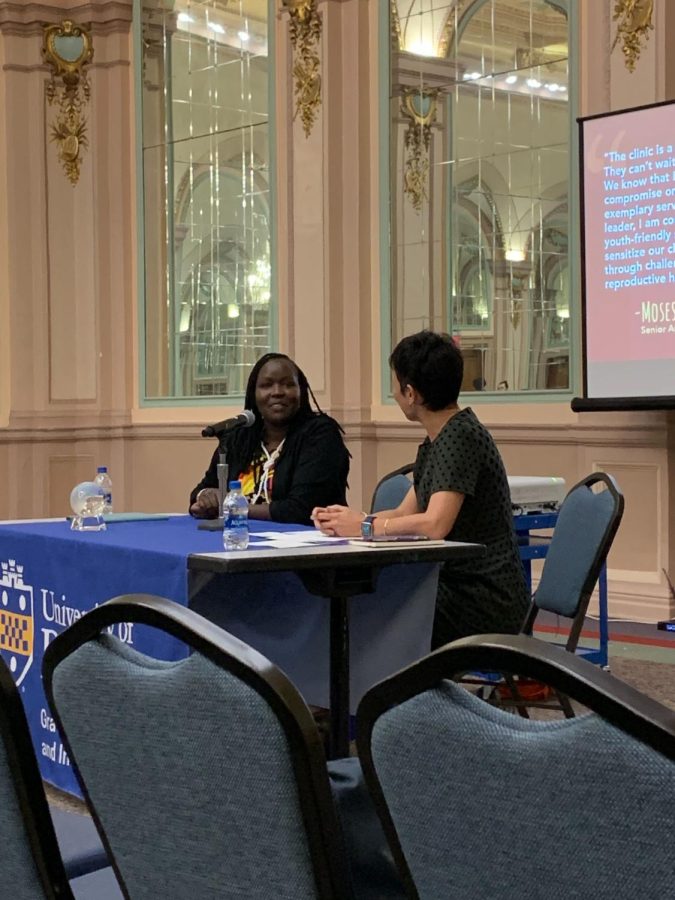Distinguished Pitt scholar receives 2023 Exemplary Leader award for advocacy work in Kenya
Kakenya Ntaiya at an event honoring her in the William Pitt Union Monday afternoon.
March 29, 2023
Pitt’s Johnson Institute for Responsible Leadership presented Kakenya Ntaiya with the annual Exemplary Leader award on Monday. Ntaiya, who earned her doctorate in education at Pitt, is known for her work supporting women’s and girls’ health care and empowerment in Kenya.
“I am just doing what my heart loves to do. And I’m really grateful that I get to be honored,” Ntaiya said during her lecture.
Ntaiya received the award at a ceremony that took place in the William Pitt Union Ballroom on Monday afternoon. Ntaiya also gave a lecture during the event about her personal experience and the details of her health care advocacy.
Shortly after graduating, Ntaiya founded the Kakenya Center for Excellence, a school in Kenya dedicated to improving education opportunities for local girls who she said would otherwise marry before they finish high school.
Julia Santucci, a professor in GSPIA and director of the Johnson Institute, explained that the process for selecting the recipient of the Exemplary Leader is “student-driven.”
“Every year we ask the students to go out and look around and see what leaders are inspiring them,” Santucci said. “Kakenya just seemed like the obvious choice to all of us, I think, not only given her Pitt connection, but also just given the importance of the work she is doing.”
Ntaiya grew up in a community in Kenya where she experienced regular domestic violence and was engaged at the age of five. However, she managed to convince her father and her community elders to let her pursue an education instead, and eventually she earned a scholarship to attend college in the U.S.
Ntaiya said once she was in the U.S., she kept thinking about her own experience and the ways in which girls were still suffering from health care inequality in her community.
“In these remote areas that we are in, about 80% of females, women and girls have gone [through] female genital cutting (FGM), 50% of the girls are married before they’re 18 years old, and 40% of girls [between] the ages of 15 to 19 have had at least one child,” she said.
Ntaiya said she was still in school when she began thinking about the ways she wanted to help women and girls “go to school, achieve [their] full potential and lead a life free of violence.”
“While I was here as a student, I kept going home, and I found out every year, a girl in this marriage,” Ntaiya said. “Every year, I would ask who it is she’s married, and that itself would not allow me to just sit in class and say, ‘I will wait for a perfect time that I can actually go and solve this problem.’”
Ntaiya named her nonprofit “Kakenya’s Dream,” which encompasses her vision of health care equality and education opportunities for the women and girls in Kenya.
Ntaiya explained that “health care” expands into the communities and the culture of gender roles in Kenya, the institutions that allow domestic violence and education restrictions to continue.
“We talk about leadership, and leadership is really knowing about your rights, because most of these laws, like child marriage is against the law in Kenya [and] FGM is against the law in Kenya, but still, it’s happening,” Kakenya said. “It’s underground. And so you need to educate both boys and girls to really start tackling these issues from their point of view.”
She said health care involves not only addressing the physical needs of the community but also the trauma that women and girls experience as a result of FGM and child marriage. Thus, education is a cornerstone of her advocacy.
“We need to talk about bodies and growing up, and so for us, we needed to talk about what FGM is, what child marriage is and how that impacts the children,” Kakenya said. “It’s taboo to talk about sexual violence, it’s taboo to talk about this, but we wanted to tackle these issues, because we know that if we do not break the silence, it’s going to continue for generations to come.”
Since founding the Kakenya Center for Excellence, establishing the Health and Leadership training program and starting the Linda Dada campaign to reduce unplanned teen pregnancies post-COVID, the nonprofit has educated 19,000 Kenyan children on health and human rights.
“[Change] is not going to happen overnight,” Ntaiya said. “It takes time. And we have to invest in that. We have to go back there. We have to keep changing the systems that are in there for generations. It’s really about building a really strong network of young people who are going to really take over.”
Ryan Scholl, a senior political science major who attended Ntaiya’s lecture, described the experience as “eye-opening.”
“My biggest takeaway was how the impact of the work being done is altering the practices of cultural traditions in the communities, allowing girls the opportunity of far greater education and the chance of marital protections and freedoms,” Scholl said, relating Ntaiya’s work back to his own studies on gender and politics.
Santucci added that her own advice for students who wanted to engage in human rights advocacy was that “leadership occurs at every level.”
“You don’t have to wait to get started,” Santucci said. “You don’t have to wait until you reach a certain age or a certain position to consider yourself a leader. You’re a leader right now as an undergraduate or a graduate student here at Pitt.”
Editor’s Note: A previous version of this article misspelled Kakenya Ntaiya’s last name. The article was also updated to clarify that Kakenya’s Dream is a nonprofit. The Pitt News regrets these errors.



